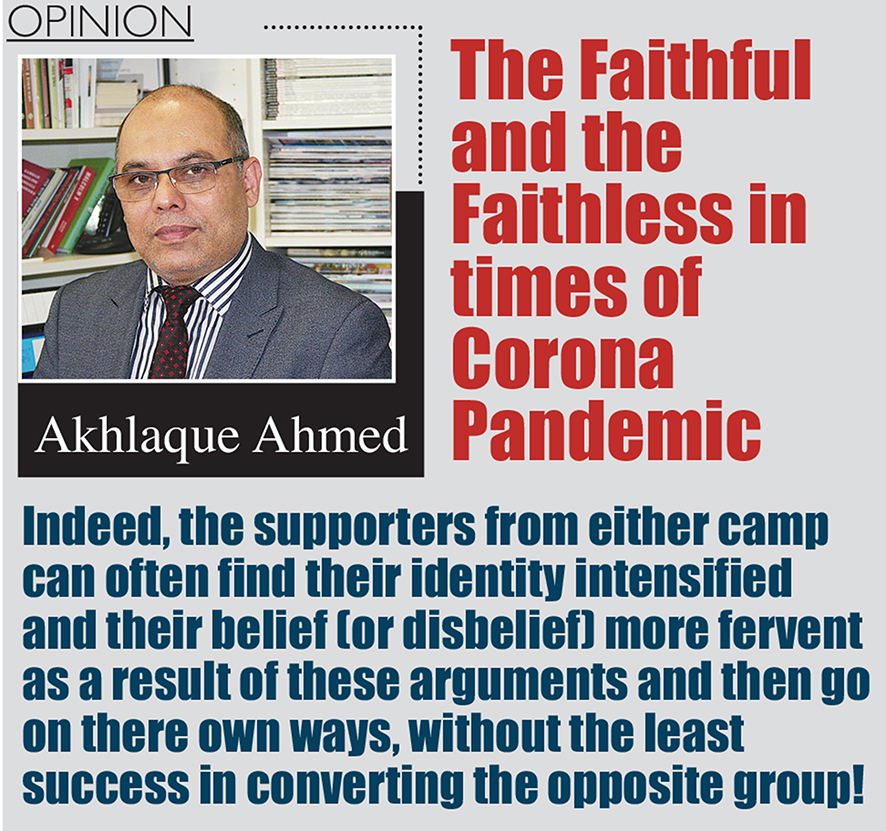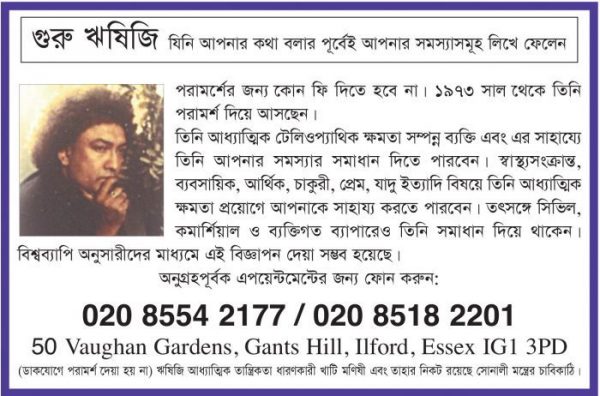The Faithful and the Faithless in times of Corona Pandemic


Religion is supposed to be a source of comfort in times of confusion and suffering. Organized religions have practices that is observed in social gatherings. Christians call it ‘Masses’, Muslims call it ‘Salah’, Hindus call it Puja although the actual rituals are miles apart.
For orthodox Hindus, dawn and dusk are greeted with recitation from the Rig Veda of the Gayatri Mantra for the Sun, which can be performed either alone or in groups.
However, on the onslaught of Corona syndrome, everywhere you look religious services are being suspended especially in the West. Governments have imposed stricter rules and in many so called traditionally faithful countries such as Saudi Arabia and Iran, the doors of mosques have been closed sine die.
No one should dispute the need to strictly limit ritual gatherings and comply with public safety regulations, especially after the devastating effects Corona have caused on public health system in many super developed European nations.
People from all walks of life, with faith or without faith, have come to the common understanding that holy water is not a hand sanitizer and prayer is not a vaccine. Political decisions aimed to guarantee public safety should be based solely on scientific evidence.
It is interesting to note that people of all faiths, i.e. people with faith and people without faith, are having a wry smile on their respective chins which clearly has a simple message hanging on, saying loudly and clearly ‘I told you before!’
The faithfuls say, “All sickness and all health is from God. Whatever happens to us is God’s will.
The likelihood of dying from the coronavirus is only 1 percent, while the possibility of dying at any moment is 100 percent.”
The faithless say, “The coronavirus is yet another piece of evidence that humans are all ‘atheists’. People do not believe what they say they believe. People are on their own, their own hope, but they do not seem to know.”
Those who are in between, like many here, admit that Faith does provide solace in uncertain times, but mass religious experiences are also proving to be dangerous multipliers of the coronavirus if we look at the Korean and Malaysian examples.
Nevertheless, both faithful and faithless are passing a very busy schedule these days, trying to prove their respective points of view. Social media is full of their arguments and counter arguments.
Indeed, the supporters from either camp can often find their identity intensified and their belief (or disbelief) more fervent as a result of these arguments and then go on there own ways, without the least success in converting the opposite group!
Think of the fervour of the ‘believers’ who are flooding the social media with their firm conviction that Corona virus is attacking China because of their mistreatment of the Uighur Muslims. And then there are those who are prescribing all sorts of divine remedies in times of such calamities and sharing those prescriptions ‘en masse’ on on social groups including WhatsApp and Viber. Counter it with the tacit and tongue in cheek comments from the opposite group who sigh witnessing the utter nonsense of those ‘undeveloped minds’, saying these social platforms have become a ‘waz-mehfil’!
But for believers, religion is a fundamental source of spiritual healing and hope. It is a remedy against despair, providing psychological and emotional support that is an integral part of well-being.
While some religious leaders still see the group religious activities as particularly essential at a time when an invisible and pervasive menace like coronavirus strikes not just bodies but also souls, spreading panic and eroding social trust, the secular faithless minds, who rather prefer to identify themselves as humanists, see this as a possible public hazard which, if allowed to go with a free hand, will be jeopardizing and compromising the collective safety of the society and the country. ‘If there is a God, then what is he doing now?’ They ask. ‘And why hasn’t He saved mankind from coronavirus?’
Prompt comes the answer from the believers. “God takes no pleasure in suffering. His desire is that such crises will generate some humility; that it will cause us to recognize our sins and change our behavior.”
“It’s science stupid, it is science. We believe in science what you might know as God.’- argues the Faithless.
“God is great, in fact greater than your science and greater than everything your scientific mind could possibly conceive.’- the faithful replies.
And the arguments go on.
But what will happen to the rest of us? This highly infectious coronavirus flu has triggered a worldwide contagion of irrational fear and emotion. Man has lost his mind. The ramifications of this universal abdication of reason are vast and unknown. Right now, the world is in total lockdown.
What’s the difference between the viewpoints of these two groups? Apparently they are poles apart. But could there be a a meeting point or a third point where others, who do not consider themselves belonging to either of these groups, can find some shelter and thrive?
A handful of people think, yes they can. Having faith or no faith, having faith in organised religion or faith in science – both are actually faithful. The only difference is that scientific faith Is different from religious faith. When a top scientist was pushed to explain his views on organised religion, he annoyingly replied, “I’m not going to denigrate you because of your faith, and you shouldn’t denigrate me for mine.”
Seems like we have heard it somewhere. For you is your religion, and for me is my religion.” (Qur’an 109:6).The faithful knows that he had been taught this in his holy book.
There is another verse that says “If we had willed it so, we could have led everyone to the right path. But, this word of Mine will definitely come into reality : ‘ I will fill Hell with some of the jinns and the humans’.” (Qur’an 32:13), meaning that god did not wish to compel the human minds to tread His chosen path, rather He has bestowed them with ‘free wills’ and He wanted to see how they use their individual free wills.
So, accept the differences and similarities as they are and focus your efforts for a better and benign society. There shall always be an underlying tension around religious freedom and scientific findings. The faithful in science will say they believe in natural selection, but not all will be able to explain how natural selection works. The faithful in God will say they believe in God, but not all will be able to explain how God’s designs work. We are back to square one. Life is too brief; there is too much to know and not enough time. We need epistemological shortcuts.
But, however, we must not hinder science to keep finding the answers to the riddles those epistemological shortcuts offer. After all, it is God who gifted the scientists with advanced brains. God said ‘We will show them Our signs in the horizons and within themselves until it becomes clear to them that it is the truth (41:53).
How do the believers expect to see the ‘signs in the horizons and within themselves’ unless the scientists keep doing what they are doing? Let there be light and let the scientists find out the source of that light. End of the day, it would surely satisfy the true believers and the scientists as well.
akhlac@yahoo.com








